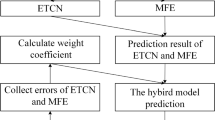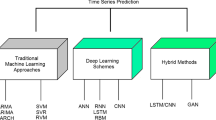Abstract
As we all know, the nonlinearity and non-stationarity of the cloud task series bring great challenges for accurate prediction. To solve this problem, this paper proposes a hybrid method which consists of empirical model decomposition (EMD) and time convolutional networks (TCN) to predict the numbers of the future tasks arriving the datacenters. In this approach, the singular spectrum analysis is used to eliminate the noises and extracts the trend information of the original cloud task series; the cloud task series was decomposed into several subsequences by EMD, which attenuates the interaction between subsequences in the original sequence; and then the TCN is used to predict the sub-sequences and get the prediction result of the trend of each sub-sequences. The prediction results of all the sub-sequences are reconstructed to obtain the final prediction results. Experimental results show that the proposed EMD-TCN algorithm has higher prediction accuracy.
Access this chapter
Tax calculation will be finalised at checkout
Purchases are for personal use only
Similar content being viewed by others
References
Lu, Y., Panneerselvam, J., Liu, L., et al.: RVLBPNN: a workload forecasting model for smart cloud computing. Sci. Program. 2016, (2016)
Gupta, S.F., Dinesh, D.A.: Resource usage prediction of cloud workloads using deep bidirectional long short term memory networks. In: 2017 IEEE International Conference on Advanced Networks and Telecommunications Systems (Ants), pp. 1–6 (2017)
Tang, X.: Large-scale computing systems workload prediction using parallel improved LSTM neural network. IEEE Access 7, 40525–40533 (2019)
Bi, J., Yuan, H., Zhang, L., et al.: SGW-SCN: an integrated machine learning approach for workload forecasting in geo-distributed cloud data centers. Inf. Sci. 481, 57–68 (2019)
Tang, X., Liao, X., Jie, Z., et al.: Energy efficient job scheduling with workload prediction on cloud data center. Cluster Comput. 21(3), 1581–1593 (2018)
Zhang, Q.C., Yang, L.T., Yan, Z., et al.: An efficient deep learning model to predict cloud workload for industry informatics. IEEE Trans. Ind. Inf. 17(7), 3170–3178 (2018)
Lea, C., Flynn, M.D., Vidal, R., Reiter, A., Hager, G.D.: Temporal convolutional networks for action segmentation and detection. In: 2017 IEEE Conference on Computer Vision and Pattern Recognition (CVPR), Honolulu, HI, pp. 1003–1012 (2017)
Vautard, R., Ghil, M.: Singular spectrum analysis in nonlinear dynamics, with applications to paleoclimatic time series. Phys. D: Nonlinear Phenom. 35(3), 395–424 (1989)
Huang, N.E., Shen, Z., Long, S.R., et al.: The empirical mode decomposition and the Hilbert spectrum for nonlinear and non-stationary time series analysis. In: Proceedings of the Royal Society of London. Series A: Mathematical, Physical and Engineering Sciences, vol. 454, no. 1971, pp. 903–995 (1998)
Ho, J., Hsiu, P., Chen, M.: Improving serviceability for virtual clusters in bandwidth-constrained datacenters. In: 2015 IEEE 8th International Conference on Cloud Computing, pp. 710–717 (2015)
Acknowledgment
This work was supported in part by the Hebei Province Science and Technology Plan Project: Construction and Application of Wind Power “Smart Capsule” Cloud Management Platform Based on Big Data Technology under Grant 17214304D, and in part by the key technologies R & D program of Tianjin under Grant 17ZXFWGX00030.
Author information
Authors and Affiliations
Editor information
Editors and Affiliations
Rights and permissions
Copyright information
© 2021 The Author(s), under exclusive license to Springer Nature Switzerland AG
About this paper
Cite this paper
Lin, T., Hao, Z., Su, D. (2021). Cloud Task Prediction Model Based on Singular Spectrum Analysis, Empirical Mode Decomposition and Temporal Convolutional Network. In: Meng, H., Lei, T., Li, M., Li, K., Xiong, N., Wang, L. (eds) Advances in Natural Computation, Fuzzy Systems and Knowledge Discovery. ICNC-FSKD 2020. Lecture Notes on Data Engineering and Communications Technologies, vol 88. Springer, Cham. https://doi.org/10.1007/978-3-030-70665-4_11
Download citation
DOI: https://doi.org/10.1007/978-3-030-70665-4_11
Published:
Publisher Name: Springer, Cham
Print ISBN: 978-3-030-70664-7
Online ISBN: 978-3-030-70665-4
eBook Packages: Intelligent Technologies and RoboticsIntelligent Technologies and Robotics (R0)




